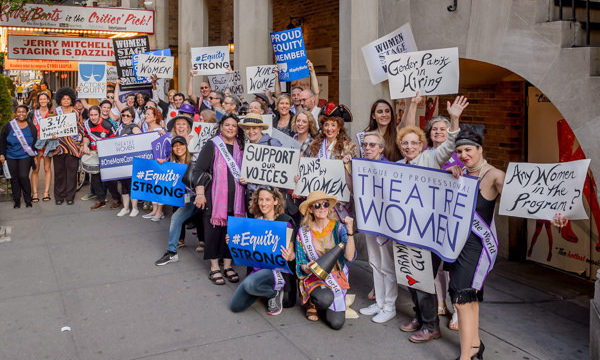This blog post was written by Kelli Lynn Harrison and Catherine Porter from the The League of Professional Theatre Women for our 2018 PowHer The Vote campaign.
The League of Professional Theatre Women calls on all gender parity allies to exercise their agency and power through voting. Wait – why is the League making that call? Are we a networking organization or an advocacy one? Well, we’re both. If we don’t advocate for all theatre women, there won’t be a need for networking because there won’t be sufficient opportunities for work. And if we don’t build networks among theatre women, any advocacy effort will not be as successful as it can be. The road to parity – in any industry – requires both advocacy and networking.
In the wake of #MeToo, it continues to be the League’s position that true sustained change in theatre cannot happen without Equitable Leadership at the helm of individual theatrical productions, at production companies and institutional organizations, and in elected and appointed government positions. The former requires networking and assertive diplomacy on interpersonal and organizational levels – the latter, requires networking, mobilizing, and voting.
Several years ago, the League determined that we needed numbers to illustrate the overwhelming lack of gender parity in NYC Off-Broadway theatre. The League of Professional Theatre Women’s Women Count report series, authored by Martha Wade Steketee with Judith Binus, has published analyses of production credits to assess questions of gender parity in theater hiring decisions since 2014. The goal of the report series is to change the conversation from anecdotes to advocacy on behalf of theatre women. The Women Count report series and its media coverage has become part of the national conversation on gender parity in theatre. The February 2018 Women Count report covers hiring trends in 13 categories (including playwrights, directors, designers, stage managers), 23 theatre companies, seven seasons (2010-2011 through 2016- 2017), and nearly 700 productions.
In response to the reality the numbers illustrate, at the 2018 Theatre Women Awards this past spring the League launched a new advocacy campaign. #OneMoreConversation is a call to decision-makers to have one more conversation with a theatre woman before making a hiring decision. It’s repeatable vocabulary that gives theatre leaders a straightforward, achievable tool for expanding their pool of collaborators and diversifying their creative teams. Why just one more conversation? It’s a reasonable request, not onerous or pressured – simply a commitment to put a woman in the mix. If that one conversation doesn’t result in a job, that decision-maker’s network will still grow to include another theatre woman, expanding the pipeline. They might recommend her to others or collaborate with her in the future. Since relationships are everything in our field, #OneMoreConversation has the potential for far-reaching, long-term impact. A key tenet of effective change is to also have allies in positions that can make a difference to whom we can collectively advocate.
Our inclusion accomplices are making a difference with their campaigns, too. All across social media #5050by2020, #parityraid, #ChangetheStage are raising calls to action for our industry. And we are seeing changes – in the last 6 months, for instance, at least half a dozen women were named Artistic Directors at major regional theatres previously led by men – but we have work to do in our own home town and even more work to do for sustained change across the country.
The old adage “a rising tide lifts all boats” has become a rallying cry for us at the League this fall. What advances one advances all.
Every time theatre women gather together, whether online through social media or in person, with the purpose of advocating for change in the industry, we expand our personal networks of advocacy allies and professional theatre women working for change.
Every time theatre women gather to get to know each other and our work; support one another; create visibility for each other’s work and opportunities for more work; give awards recognizing women toiling in the trenches; and document the stories of theatre women who have spent their lives making an impact (all of which are at the heart of what the League does), we advocate for all women in the industry.
Every time a gender parity ally is voted into office, there is a greater chance for sustained change.
Networking is advocacy. Advocacy is networking. Every time a woman succeeds in our industry it makes way for more theatre women to do so. A rising tide lifts all boats. We are all called to be that tide. Please vote.


